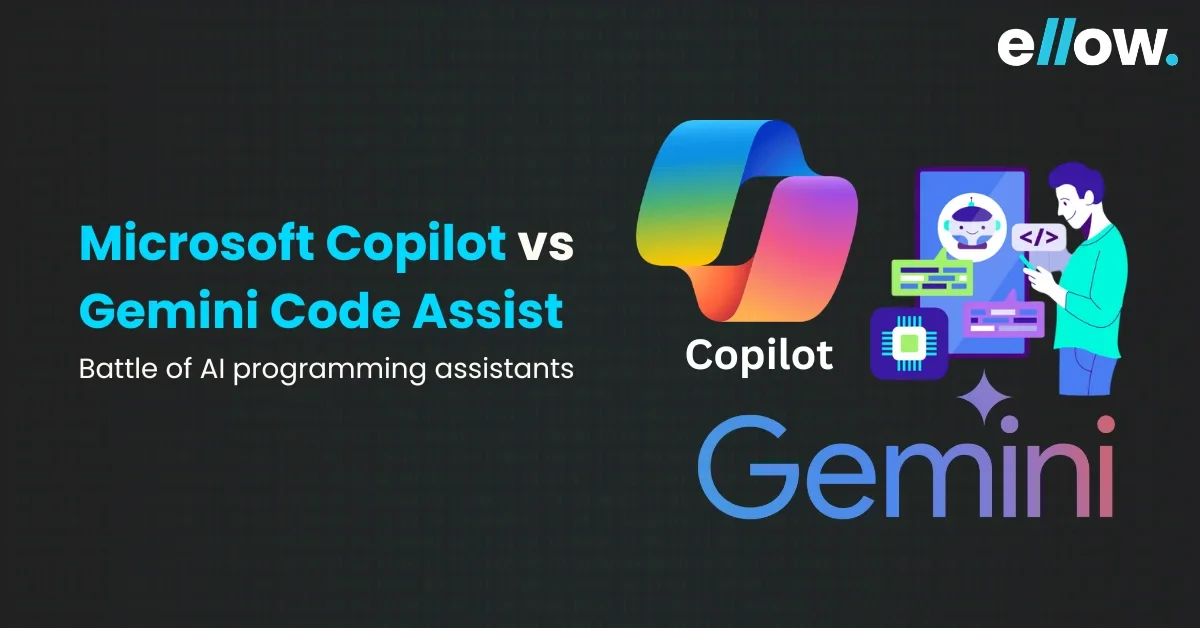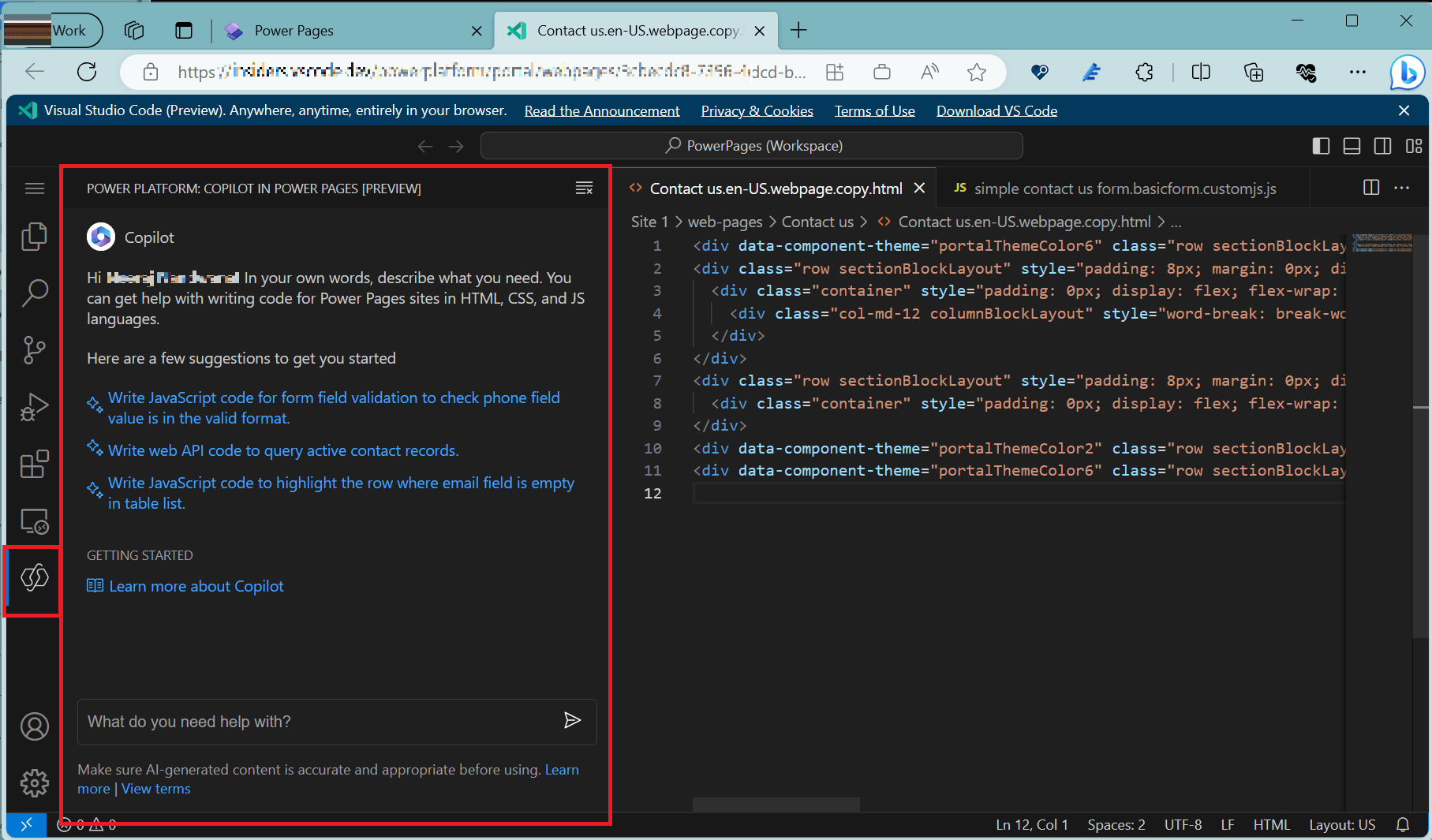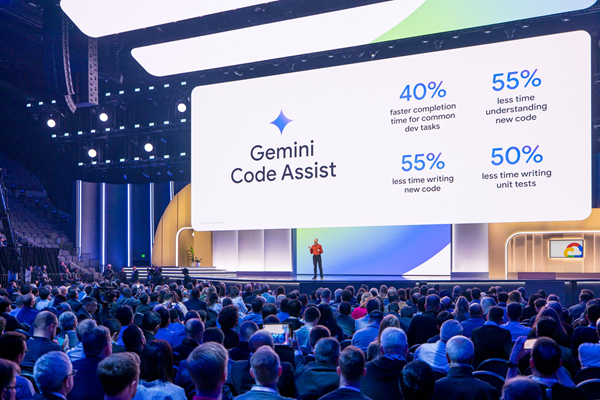Let’s build the future together.
Great ideas need great people. Partner with us to bring your vision to life, or take the first step in your career by joining our team of innovators.

Google Gemini and Microsoft Copilot are two of the leading competitors in AI-powered code assistance. At first glance, their similarities are striking, comparable interfaces, analogous functionalities, and even identical pricing structures. However, a closer examination reveals a significant discrepancy in the value proposition.
According to Statista, the AI Copilot enhancement market is expected to reach $37.7 billion by 2026, underscoring the growing reliance on such technologies among developers.
Similarly, the generative AI market is projected to grow substantially, with forecasts indicating a significant uptick in demand. Having meticulously tested Copilot and Gemini within their respective ecosystems, we present an insightful comparison to aid developers in discerning the optimal solution for their specific needs.
Whether seeking enhanced productivity, code quality improvements, or seamless integration, our guide provides actionable recommendations tailored to diverse use cases.
Microsoft Copilot is an AI assistant designed to aid developers in writing code more efficiently. It integrates with Microsoft 365 apps and is powered by OpenAI’s GPT-3.5 and GPT-4 Large Language Models (LLMs).

Customization and Learning: Over time, Copilot learns from the code you write and adapts its suggestions to better fit your coding style and preferences.
Check this video out: 5 Best AI Coding Assistant Tools in 2024
Experts from the industry have shared their opinions about the implications of Copilot.
“Copilot boosts productivity but cannot reason about code correctness or intent. The output still requires thorough human review.” — Nat Friedman, CEO of GitHub
“Copilot reduces drudgery for common coding patterns but still requires human guidance on complex problem-solving and business logic.” — Donovan Brown, Principal Developer Advocate at Microsoft
“The future of AI pair programmers looks promising but concerns exist around code originality and licensing issues.” — Professor Daniela Rus, Director of MIT Computer Science and Artificial Intelligence Lab
“Copilot suggests syntactically valid code but doesn’t ensure semantic correctness — you still need testing, type checking, etc.” — Robert “Uncle Bob” Martin, software engineer and author
The general agreement is clear — while Copilot significantly enhances productivity, it is not yet a complete substitute for human developers. It is advisable to use it responsibly and under careful human supervision.

Gemini is Google’s latest generative AI chatbot, succeeding Google’s Bard in 2024. Powered by the Gemini LLM, Google’s “best family of large language models,” Gemini is designed to integrate with various Google Workspace apps, including documents, presentations, spreadsheets, and mail.
Sundar Pichai, on behalf of Google’s team, highlighted Gemini’s enhanced capability to handle up to 1 million tokens of context. This allows developers to work with large codebases or datasets in a single instance, providing an unprecedented scope of understanding and interaction with the data. This is particularly beneficial for tasks requiring deep analysis of extensive programming projects or data sets (blog.google).
Gemini offers several advantages for developers:
While Gemini offers significant benefits, it also has some limitations:
Developers can leverage Google Gemini for various purposes, including:
Microsoft Copilot offers robust code completion capabilities, leveraging advanced AI models to suggest contextually relevant code snippets based on the current context. Its integration with GitHub provides access to vast code repositories, enriching its suggestion pool with real-world examples.
On the other hand, Gemini Code Assist, now known as Code Assist, boasts a million-token context window, allowing for extensive code analysis and transformation. This enhancement enables developers to make informed decisions and streamline development workflows, particularly useful for large-scale code modifications across entire code bases.
Microsoft Copilot supports a wide range of programming languages, including popular ones like Python, JavaScript, Java, C++, and more. Its extensive language support caters to diverse developer needs and projects across various domains.
Similarly, Code Assist also offers robust language support, ensuring compatibility with multiple programming languages commonly used in software development. Developers can expect accurate and relevant code suggestions regardless of the language they’re working with, enhancing productivity and code quality.
Microsoft Copilot learns from the user’s coding patterns over time, improving its suggestions and adaptability to individual coding styles. Through continuous usage, developers can expect Copilot to offer increasingly accurate and personalized code completions tailored to their preferences.
Code Assist, on the other hand, excels in adaptability to enterprise environments, offering fine-tuning capabilities based on a company’s internal code base. Through partnerships with industry-leading companies and access to invaluable insights, Code Assist enhances its ability to deliver accurate and relevant code suggestions, thereby driving efficiency in software development processes.
Both Microsoft Copilot and Code Assist offer powerful code completion capabilities with extensive language support and adaptation to users’ coding patterns. The choice between the two ultimately depends on individual preferences, project requirements, and integration preferences with other tools and platforms.
Regarding AI quality, Microsoft Copilot emerges as the frontrunner compared to Google Gemini. Copilot, fueled by OpenAI’s GPT-4, showcases superior accuracy and consistency in its outputs. While occasional inaccuracies persist, they have significantly reduced since its initial release.
On the other hand, Gemini, despite its human-like conversational abilities, frequently errs in providing accurate information, often exaggerating its capabilities. Additionally, Gemini suffers from memory lapses, occasionally deleting earlier prompts and answers, potentially resulting in the loss of valuable work.
Both Copilot and Gemini offer user-friendly interfaces but with some distinctions. Gemini’s UI is clean and intuitive, resembling ChatGPT with a chat bar at the bottom and recent conversations on the left panel. It provides options to switch between basic and advanced modes, offering different levels of assistance.
In contrast, Copilot’s UI is feature-rich, offering various conversation styles and access to different GPTs for specific tasks. While Copilot’s UI may appear cluttered initially, it provides more customization options and functionalities.
When it comes to app integrations, Copilot outshines Gemini by seamlessly integrating with Microsoft 365 apps, enhancing functionality across various Microsoft platforms.
In contrast, Gemini’s integration with Google Workspace apps is still in progress, with limited functionalities available at the time of writing. While Gemini promises future improvements, Copilot’s current integration capabilities offer more convenience and efficiency to users.
Both Copilot and Gemini offer similar pricing structures for their paid plans, with Copilot Pro and Gemini Advanced priced at $20 per month for personal use and $30 per month for business use.
However, Copilot lacks a trial period, requiring upfront payment for access, whereas Gemini Advanced offers a generous 2-month free trial.
Despite the identical pricing, Copilot Pro delivers more value for money with its advanced features and integration capabilities compared to Gemini Advanced.
Sure, there’s a performance comparison of Microsoft Copilot and Gemini Code Assist:
| Performance Comparison | Microsoft Copilot | Gemini Code Assist |
| AI Quality | General-purpose AI with code generation capabilities based on OpenAI Codex. | AI quality is evolving; still under development. |
| Speed & Efficiency | Efficient at understanding existing code styles and structure, generating context-aware completions. | Superior reasoning, math, and factual accuracy; handle complex tasks and multi-modal outputs. |
| Usability | Good at code completion and suggestion, but may struggle with unfamiliar codebases or unconventional syntax. | Capable of handling various tasks like document drafting, email management, and scheduling. |
| UI Comparison | Integrates seamlessly with Visual Studio Code, providing a familiar environment for developers. | Google Workspace integration, offering an intuitive interface. |
| App Integrations | Integrates with Visual Studio Code and GitHub. | Integrates with Google Cloud services and offers API integration. |
| Pricing | Offers a free tier with limited features and paid plans for advanced functionality. | No pricing announced yet; potential for both free and paid options. |
When deciding between Microsoft Copilot and Google Gemini AI, developers should consider several factors to make the best choice for their needs.
The comparison between Microsoft Copilot and Google Gemini, alongside the analysis of ChatGPT, highlights the significant advancements AI language models bring to the table for software developers.
These models, powered by sophisticated deep learning architectures and trained on vast datasets, demonstrate remarkable capabilities in understanding and generating natural language.
Both Microsoft Copilot and Google Gemini showcase the forefront of AI-driven innovations, offering developers enhanced productivity and streamlined workflows. Their ability to assist in coding tasks, provide contextual suggestions, and accelerate development processes underscores their transformative potential in reshaping human-computer interaction.
Looking ahead, the integration of these AI language models into various applications is expected to extend beyond technological realms, influencing how we communicate, collaborate, and access information in the digital age. The journey of AI language models represents a remarkable technological breakthrough and signifies a paradigm shift in our relationship with intelligent machines.
Microsoft Copilot and Google Gemini Code Assist are AI-powered tools designed to assist software developers in coding tasks by providing contextual suggestions, auto-completion, and other productivity-enhancing features.
Microsoft Copilot leverages OpenAI’s GPT model and GitHub’s code repository to provide contextual code suggestions, while Google Gemini Code Assist utilizes Google’s vast knowledge graph and proprietary algorithms to offer intelligent code completion and assistance.
The choice between Microsoft Copilot and Google Gemini Code Assist depends on individual preferences, workflow requirements, and the specific nature of coding tasks. Developers may find one tool more intuitive or effective based on their coding style and project needs.
Yes, both Microsoft Copilot and Google Gemini Code Assist can be integrated into popular code editors and IDEs, making it seamless for developers to incorporate these AI-powered features into their workflow.
By offering intelligent code suggestions, auto-completion, and context-aware assistance, Microsoft Copilot and Google Gemini Code Assist help developers write code faster, reduce errors, and streamline the software development process, ultimately enhancing overall productivity.

Vibe Coding vs AI Assisted Coding: The Difference That Will Define the Next Generation…

From Code Generation to Bug Detection: 10 AI Tools Every Developer Should Know in…

Ten Real-World Ways Enterprises Are Using AI Teams to Build Faster in 2026
Please feel free to share your thoughts and we can discuss it over a cup of tea.
Get a quote
Vibe Coding vs AI Assisted Coding: The Difference That Will Define the Next Generation…

Six Things to Consider When Hiring Remote Talent

ellow.io enters remote hires market with AI-based screening process